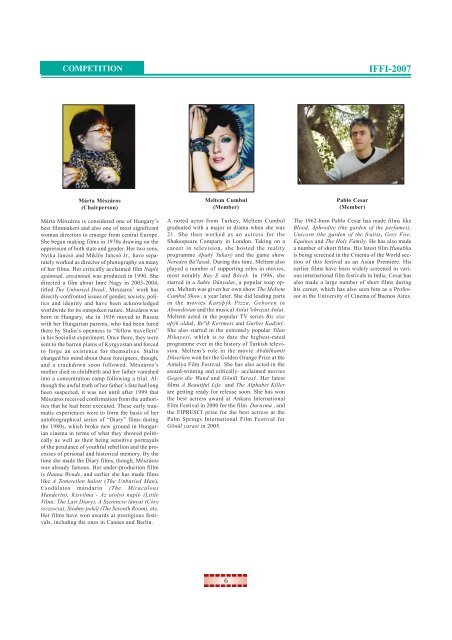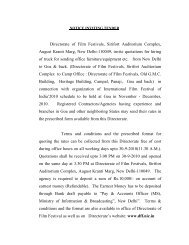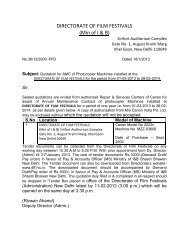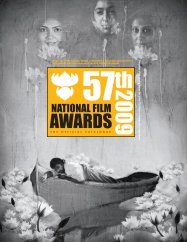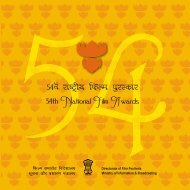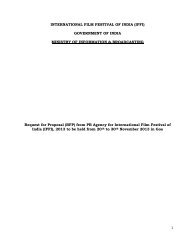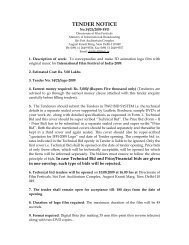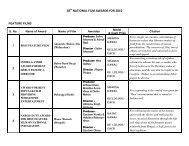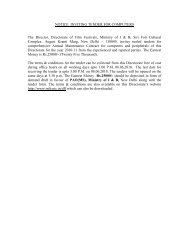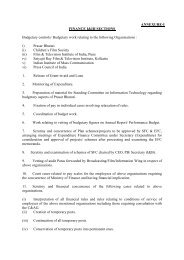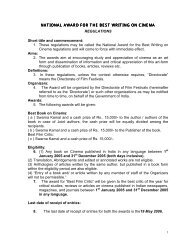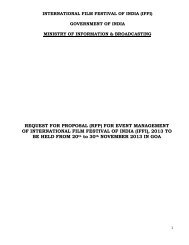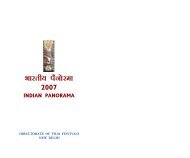Birth Centenaries - Directorate of Film Festivals
Birth Centenaries - Directorate of Film Festivals
Birth Centenaries - Directorate of Film Festivals
You also want an ePaper? Increase the reach of your titles
YUMPU automatically turns print PDFs into web optimized ePapers that Google loves.
COMPETITION<br />
Márta Mészáros<br />
(Chairperson)<br />
Márta Mészáros is considered one <strong>of</strong> Hungary’s<br />
best filmmakers and also one <strong>of</strong> most significant<br />
woman directors to emerge from central Europe.<br />
She began making films in 1970s drawing on the<br />
oppression <strong>of</strong> both state and gender. Her two sons,<br />
Nyika Jancsó and Miklós Jancsó Jr., have separately<br />
worked as director <strong>of</strong> photography on many<br />
<strong>of</strong> her films. Her critically acclaimed film Napló<br />
apámnak, anyámnak was produced in 1990. She<br />
directed a film about Imre Nagy in 2003-2004,<br />
titled The Unburied Dead.. Meszaros’ work has<br />
directly confronted issues <strong>of</strong> gender, society, politics<br />
and identity and have been acknowledged<br />
worldwide for its outspoken nature. Mészáros was<br />
born in Hungary, she in 1936 moved to Russia<br />
with her Hungarian parents, who had been lured<br />
there by Stalin’s openness to “fellow travellers”<br />
in his Socialist experiment. Once there, they were<br />
sent to the barren plains <strong>of</strong> Kyrgyzstan and forced<br />
to forge an existence for themselves. Stalin<br />
changed his mind about these foreigners, though,<br />
and a crackdown soon followed. Mészáros’s<br />
mother died in childbirth and her father vanished<br />
into a concentration camp following a trial. Although<br />
the awful truth <strong>of</strong> her father’s fate had long<br />
been suspected, it was not until after 1999 that<br />
Mészáros received confirmation from the authorities<br />
that he had been executed. These early traumatic<br />
experiences were to form the basis <strong>of</strong> her<br />
autobiographical series <strong>of</strong> “Diary” films during<br />
the 1980s, which broke new ground in Hungarian<br />
cinema in terms <strong>of</strong> what they showed politically<br />
as well as their being sensitive portrayals<br />
<strong>of</strong> the petulance <strong>of</strong> youthful rebellion and the processes<br />
<strong>of</strong> personal and historical memory. By the<br />
time she made the Diary films, though, Mészáros<br />
was already famous. Her under-production fillm<br />
is Hanna Wende, and earlier she has made films<br />
like A Temetetlen halott (The Unburied Man),<br />
Csodálatos mandarin (The Miraculous<br />
Manderin), Kisvilma - Az utolsó napló (Little<br />
Vilna: The Last Diary), A Szerencse lányai (Córy<br />
szczescia), Siódmy pokój (The Seventh Room), etc.<br />
Her films have won awards at prestigious festivals,<br />
including the ones in Cannes and Berlin.<br />
Meltem Cumbul<br />
(Member)<br />
A noted actor from Turkey, Meltem Cumbul<br />
graduated with a major in drama when she was<br />
21. She then worked as an actress for the<br />
Shakespeare Company in London. Taking on a<br />
career in television, she hosted the reality<br />
programme Aþaðý Yukarý and the game show<br />
Nereden Baºlasak. During this time, Meltem also<br />
played a number <strong>of</strong> supporting roles in movies,<br />
most notably Bay E and Böcek. In 1996, she<br />
starred in a Sahte Dünyalar, a popular soap opera.<br />
Meltem was given her own show The Meltem<br />
Cumbul Show, a year later. She did leading parts<br />
in the movies Karýþýk Pizza, Geboren in<br />
Absurdistan and the musical Anlat ªehrazat Anlat.<br />
Meltem acted in the popular TV series Biz size<br />
aþýk olduk, Beºik Kertmesi and Gurbet Kadýný.<br />
She also starred in the extremely popular Yilan<br />
Hikayesi, which is to date the highest-rated<br />
programme ever in the history <strong>of</strong> Turkish television.<br />
Meltem’s role in the movie Abdülhamit<br />
Düserken won her the Golden Orange Prize at the<br />
Antalya <strong>Film</strong> Festival. She has also acted in the<br />
award-winning and critically- acclaimed movies<br />
Gegen die Wand and Gönül Yarasý. Her latest<br />
films A Beautiful Life and The Alphabet Killer<br />
are getting ready for release soon. She has won<br />
the best actress award at Ankara International<br />
<strong>Film</strong> Festival in 2000 for the film Durusma , and<br />
the FIPRESCI prize for the best actress at the<br />
Palm Springs International <strong>Film</strong> Festival for<br />
Gönül yarasi in 2005.<br />
6<br />
Pablo Cesar<br />
(Member)<br />
IFFI-2007<br />
The 1962-born Pablo Cesar has made films like<br />
Blood, Aphrodite (the garden <strong>of</strong> the perfumes),<br />
Unicorn (the garden <strong>of</strong> the fruits), Grey Fire,<br />
Equinox and The Holy Family. He has also made<br />
a number <strong>of</strong> short films. His latest film Hunabku<br />
is being screened in the Cinema <strong>of</strong> the World section<br />
<strong>of</strong> this festival as an Asian Premiere. His<br />
earlier films have been widely screened in various<br />
international film festivals in India. Cesar has<br />
also made a large number <strong>of</strong> short films during<br />
his career, which has also seen him as a Pr<strong>of</strong>essor<br />
in the University <strong>of</strong> Cinema <strong>of</strong> Buenos Aires.


